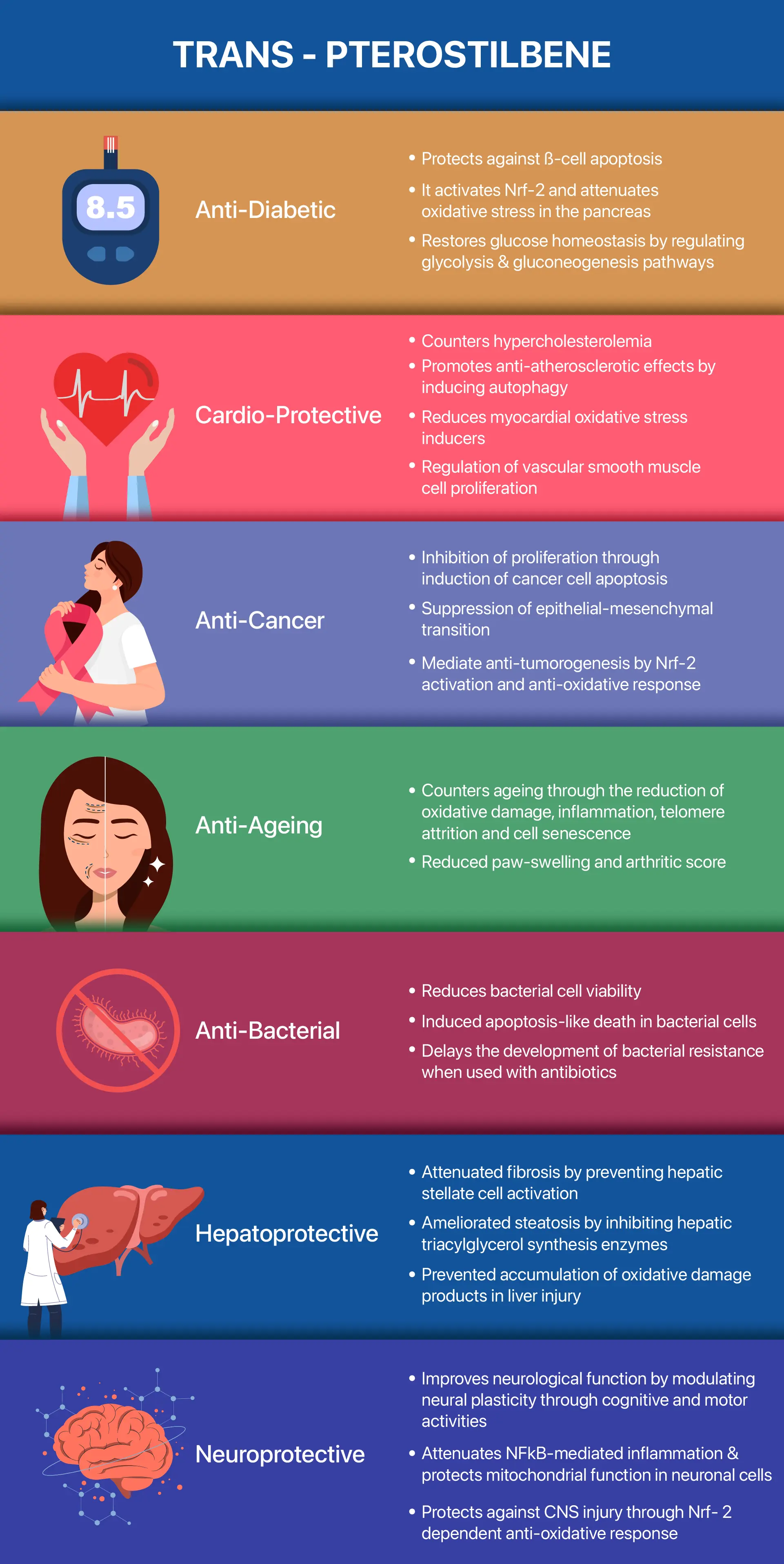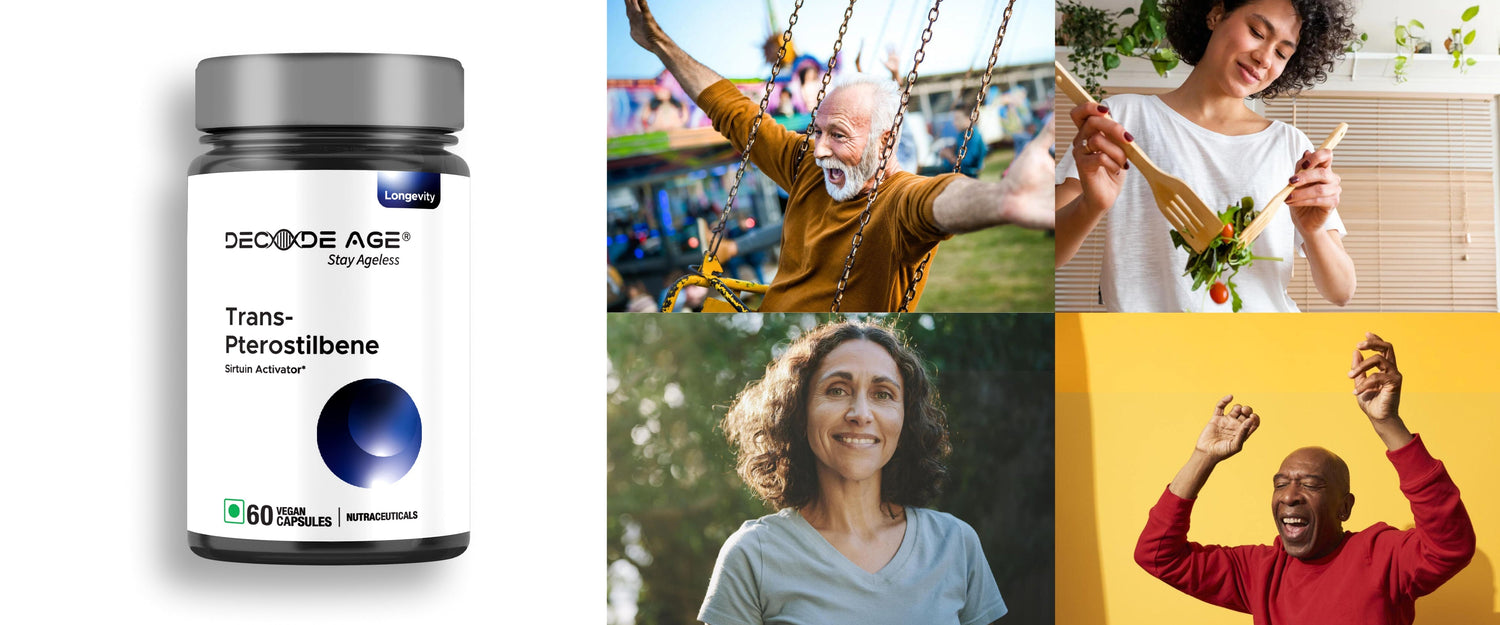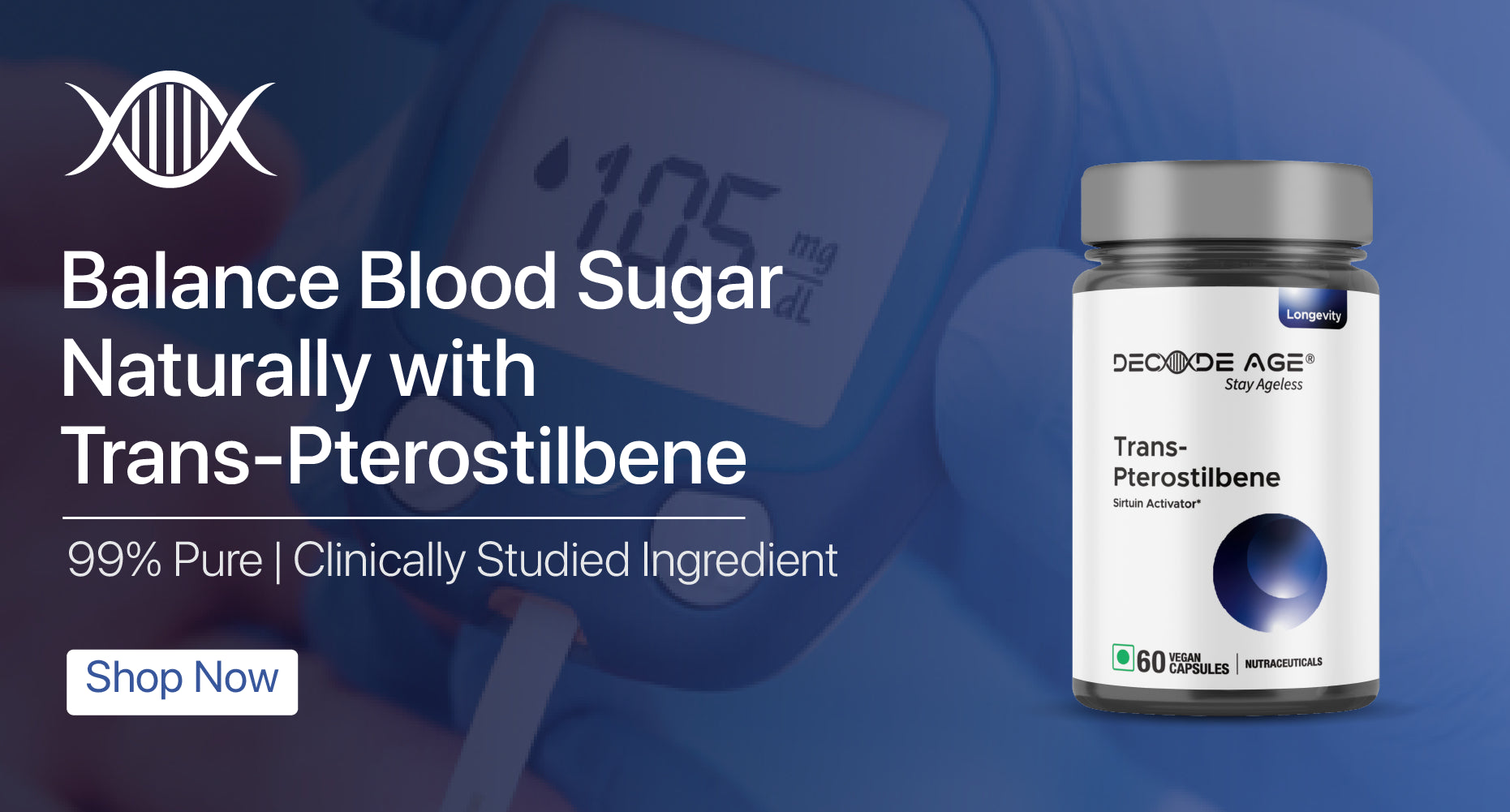Trans Pterostilbene, found in plants such as blueberries, is a member of the stilbene group, similar to resveratrol but with unique health advantages. Renowned for its powerful antioxidant characteristics, it shields the body against harm caused by free radicals. Initially identified in 1977 by Langcake and Pryce, its antioxidative potential has sparked considerable research interest. Although predominantly found in blueberries, the quantities are relatively limited, necessitating impractical consumption to achieve desired levels. Supplements offer a more practical alternative for individuals seeking higher doses of pterostilbene.
Health Benefits of Trans Pterostilbene
Pterostilbene has various health advantages, including anti-inflammatory, anticarcinogenic, and antioxidant characteristics. Studies suggest it may protect against cardiovascular ailments, enhance cognitive abilities, and boost cellular energy metabolism by activating pathways linked to longevity. Additionally, research has delved into its potential for addressing neurodegenerative disorders and conditions such as arthritis.

Resveratrol vs. Pterostilbene: Which Is Better?
When considering the choice between resveratrol and pterostilbene, it's important to note that their structural differences significantly impact their metabolic pathways and overall effectiveness within the body. Pterostilbene, being more lipophilic with higher oral absorption (80%) as compared to resveratrol, boasts superior bioavailability and biological activity compared to resveratrol. This indicates that pterostilbene is generally preferable due to its enhanced ability to be absorbed and utilised by the body efficiently.
Consumption of Decode Age Trans-Pterostilbene
Take one capsule of Trans-Pterostilbene daily after dinner, or as directed by your healthcare provider. Observe how your body reacts. Ensure a well-rounded diet and regular physical activity for optimal outcomes.
Dosage
Dosages of Trans-Pterostilbene between 200 and 700 milligrams are well-tolerated. While a low dose of 10 milligrams can offer some benefits, it seems that doses exceeding 200 milligrams provide the most notable effects.
Who Should Avoid Consuming It?
Avoid taking trans-pterostilbene if you are on blood-thinning medications. Pterostilbene supplements are not recommended for pregnant or breastfeeding women.
Side Effects and Safety
At doses up to 250 mg per day, pterostilbene has been considered safe without significant adverse effects reported.
LDL Cholesterol
In 2014 a study discovered that in healthy individuals consuming 50 mg of pterostilbene daily, there wasn't a notable increase in LDL levels. However, in those taking 100 mg per day, LDL levels saw a slight rise, although total cholesterol levels varied notably among participants, making it challenging to draw clear conclusions. Additionally, while LDL levels increased in overweight individuals taking pterostilbene, they similarly increased in the control group receiving a placebo. Consult with your physician before consuming pterostilbene if you currently have hypercholesteremia, are overweight or have concerns about your LDL levels.
Trans-Resveratrol and Trans-Pterostilbene: Compatible Combo?
Trans-resveratrol and trans-pterostilbene are naturally occurring substances in specific foods such as grapes, blueberries, and peanuts. They are part of the stilbenoid group and have similar structures, with pterostilbene being a derivative of resveratrol with added methyl groups. Both substances are recognised for their antioxidant capabilities and potential health advantages, including anti-inflammatory and cardio-protective effects.
Taking trans-resveratrol and trans-pterostilbene together appears to be safe and research suggests that the synergy of these two might even work better together, boosting their ability to act as antioxidants and promote health.
Taking Trans-Pterostilbene with Trans-Resveratrol: Take one Trans-Pterostilbene with Trans-Resveratrol capsule daily after dinner or as directed by your healthcare provider.
Is it Safe to Take Trans-Pterostilbene and NMN Together?
Pterostilbene and NMN are compounds known for their potential to promote health and combat ageing. Pterostilbene fights inflammation and acts as an antioxidant, while NMN helps produce NAD+, a coenzyme crucial for cellular functions like energy production and DNA repair. They may offer several health benefits, including enhanced metabolism, better blood sugar control, and improved DNA repair.
Taking Trans-Pterostilbene with NMN: Consume one capsule of Trans-Pterostilbene with NMN in the morning after breakfast or lunch.
Note: Ensure not to consume NMN after 3 PM, as it could potentially disrupt your circadian rhythm (sleep cycle)
Conclusion
While promising, the research on pterostilbene is still in the early stages compared to resveratrol. Its increased bioavailability and potential health benefits make it an intriguing subject for further study. As with any supplement, it's important to consult with a healthcare professional before starting use, especially at the higher doses available through supplements.
FAQs
1) What works better than resveratrol?
Pterostilbene works better than resveratrol due to its higher oral absorption (80% vs. 20%). It supports the same cellular pathways as resveratrol, aiding in antioxidant defences, inflammation balance, apoptosis, and autophagy. Research suggests that pterostilbene's molecular mechanisms are equivalent to resveratrol's, but its slightly different structure makes it more stable and bioavailable. Therefore, pterostilbene is considered a more effective choice over resveratrol.
2) What are the benefits of resveratrol with pterostilbene?
Both resveratrol and pterostilbene are natural plant compounds with potential health benefits. Together, they offer enhanced antioxidant activity, improved brain function, and anti-inflammatory properties, potentially benefiting heart health, blood sugar control, cancer prevention, and obesity management. Consult a healthcare professional before considering supplements, especially if you're taking medication.
3) Is pterostilbene worth taking?
Pterostilbene is worth taking due to its potent antioxidant properties to combat free radical damage linked to chronic diseases and ageing. It offers numerous health benefits, including improved cognitive function, cardiovascular health, and diabetes management. It also inhibits cancer growth, promotes anti-ageing mechanisms, and boosts the immune system, making it a valuable supplement for overall health and well-being.
4) Does pterostilbene increase LDL?
Pterostilbene's impact on LDL varies with dosage and metabolism. In a 2014 study, 50 mg daily showed no significant LDL increase, while 100 mg resulted in a slight rise, with varied total cholesterol. Overweight individuals had similar LDL changes with pterostilbene and placebo. Consultation with a physician is advisable, especially for those with hypercholesterolemia or weight concerns. Pterostilbene, generally safe up to 250 mg daily, may elevate LDL and lower blood pressure, particularly when used alone, but it may aid weight loss in specific groups.
Reference:
1) A Review of Pterostilbene Antioxidant Activity and Disease Modification.(McCormack, D., & McFadden, D. (2013). A Review of Pterostilbene Antioxidant Activity and Disease Modification. Oxidative Medicine and Cellular Longevity, 2013.)
2) Resveratrol and pterostilbene: A comparative overview of their chemistry, biosynthesis, plant sources and pharmacological properties.
(Chan, E. W. C., Wong, C. W., Tan, Y. H., Foo, J. P. Y., Wong, S. K., & Chan, H. T. (2019). Resveratrol and pterostilbene: A comparative overview of their chemistry, biosynthesis, plant sources and pharmacological properties. Journal of Applied Pharmaceutical Science, 9(7), 124-129.)
3) Repeat dose NRPT (nicotinamide riboside and pterostilbene) increases NAD+ levels in humans safely and sustainably: a randomized, double-blind, placebo-controlled study
(Dellinger, R. W., Santos, S. R., Morris, M., Evans, M., Alminana, D., Guarente, L., & Marcotulli, E. (2017). Repeat dose NRPT (nicotinamide riboside and pterostilbene) increases NAD+ levels in humans safely and sustainably: a randomized, double-blind, placebo-controlled study. npj Aging and Mechanisms of Disease, 3(1), 17.)























Leave a comment
All comments are moderated before being published.
This site is protected by hCaptcha and the hCaptcha Privacy Policy and Terms of Service apply.